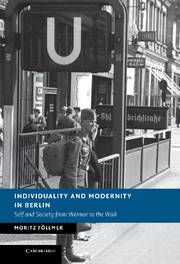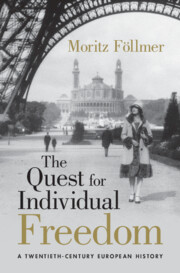Individuality and Modernity in Berlin
Moritz Föllmer traces the history of individuality in Berlin from the late 1920s to the construction of the Berlin Wall in August 1961. The demand to be recognised as an individual was central to metropolitan society, as were the spectres of risk, isolation and loss of agency. This was true under all five regimes of the period, through economic depression, war, occupation and reconstruction. The quest for individuality could put democracy under pressure, as in the Weimar years, and could be satisfied by a dictatorship, as was the case in the Third Reich. It was only in the course of the 1950s, when liberal democracy was able to offer superior opportunities for consumerism, that individuality finally claimed the mantle. Individuality and Modernity in Berlin proposes a fresh perspective on twentieth-century Berlin that will engage readers with an interest in the German metropolis as well as European urban history more broadly.
- Argues that the quest for individuality was central to the history of Berlin under both democracy and dictatorship
- Sheds new light on the historical, sociological and cultural significance of individuality and its central role in metropolitan society
- A major contribution to both German and wider European urban history in the twentieth century
Reviews & endorsements
"Moritz Föllmer’s focus in this book is about much more than the notion of individuality as a modern phenomenon … providing fresh angles into established historiographical debates … drawing on a vast array of sources, from press clippings to insurance claims and modern design plans, he demonstrates expressions of and claims to individuality as strategies in the negotiation of consent and coercion, power and privacy and everyday life … Föllmer’s analysis shines particularly bright …"
Jennifer V. Evans, European History Quarterly
Product details
February 2013Hardback
9781107030985
324 pages
229 × 152 × 19 mm
0.66kg
9 b/w illus. 1 map
Available
Table of Contents
- Introduction
- Part I. Weimar Berlin:
- 1. Risk, isolation and unstable selfhood
- 2. Flexibility, authenticity and consumption
- 3. Reform, scandal and extremism
- Part II. Nazi Berlin:
- 4. Redefining legitimate individuality
- 5. Jewish Berliners' ambiguous quest for agency
- 6. Heroism, withdrawal and privatist loyalty
- Part III. Post-War and Cold-War Berlin:
- 7. Defeat, self-help and the dissociation from Nazism
- 8. Socialist ambitions and individualist expectations
- 9. Anti-totalitarianism, domesticity and ambivalent modernity
- Conclusion.








.jpg)
.jpg)